ALLY Review in Ricepaper
November 8, 2012Thank you, Julia Park, for this moving review of our screening
at Vancouver Asian Film Festival this past weekend
(and for the only shot I have of Lucy joining me for the post-screening Q&A).
I’m passing through a road I don’t know, looking out the smoky windows of the bus and trying to act like I don’t mind that a beet-red man is standing over my seat, huffing noisily as he tries to do something with his pants with his gnarled hands. I wonder if I should give him my seat. The map on my Galaxy 3 says we’re on Hastings Street, which is appropriate. I’m trying to get to the Cineplex Odeon International Village Cinemas, 88 West Pender St.
Travelling on Hastings is right. Except I’m seven bus stops ahead of the right one. I get off and cross the street.
Eventually I brave through the rain and confusion and end up inside an enormous building which not only holds this year’s Vancouver Asian Film Festival showings, but a plethora of ethnic stores. I’m late, so I bustle through without being able to linger and browse.
I speed through the doors and fumble through the darkness into a good enough seat at the last row of the theatre. I’m immediately swept into a story about an unfamiliar Tanzanian man.
“A Lot Like You” is a part-biographical documentary by Eliachi Kimaro, who is a mixed-race American with a Tanzanian father and a South Korean mother. The movie draws largely from personal interviews with her family members in Africa, and with her parents. Viewers are taken along the journey as they join Kimaro in her search for identity in adulthood as she herself finds herself in an interracial relationship, and uncover some heavy secrets along the way.
The intimacy and honesty of Eliachi Kimaro is what makes this film a real treasure. As we watch her tell the story of how she tried to link her new marriage to the stories in her father’s lineage, we join her in the horror that ensues at the unveiling of her aunts’ stories of marriage – systemic abduction, violence, and rape.
Narrating her childhood in America as a privileged daughter of educated parents – with a father in the IMF and a mother in the World Bank – in an upper-middle class suburban neighbourhood, Kimaro’s story at first glance looks like the typical “successful immigrant” story. But of course, there is more beneath the surface.
As a biracial young girl, Kimaro weaves stories of racism and gendered violence, tying those personal accounts to the painful stories buried in her father’s homeland, Tanzania. At the foot of Mt. Kilimanjaro, where she was reluctantly made to spend every odd summer, Kimaro goes back in adulthood in search of the missing piece, the hanging question.
As a member of the audience, I wept at the sight of Kimaro’s aunts retelling stories of the abuse that they had received: female genital mutilation, rape and forced marriage…and having to face a life as the wife of the attacker, and mother of his children.
Through the camera lens, I could acutely feel the shock and pain that affected the director as her father wrote off these tragedies as culture-specific and inevitable, especially after hearing her own story of rape at the age of 7.
Tears aside, this film is not about despair, nor is it a glum manifestation of the rape script pervasive in our society, labeling rape as a figurative death for women. Kimaro’s aunts live on, and we are able to see hope in their delightful singing as they gather crops and hold celebrations. The film that we view is also a sign of Kimaro’s survival – they have emerged strong and alive.
And it is with hope that the film ends, together with a sense of resolution in the director’s search for identity. I could see from a brief sweep around the room that I hadn’t been the only one clapping with tears in my eyes. As a 1.5 Generation Canadian of immigrant parents myself, I certainly appreciated Kimaro’s exploration of her family history and was greatly touched by her determination to portray herself and her aunts not as victims but as survivors.

